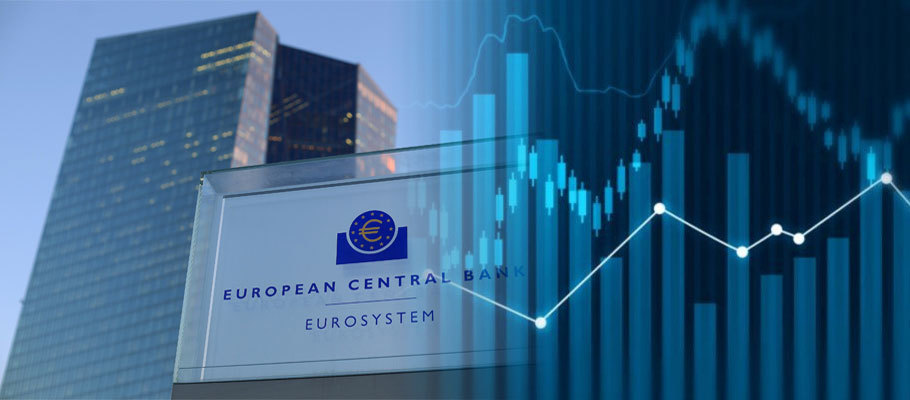
Published: November 2nd, 2022
New figures from Eurostat show that inflation in the Eurozone reached a new record high of 10.6 per cent in October. Alongside rising prices, other metrics showed the bloc's economy growing faster than forecast in the third quarter.
The dual data releases have split market opinion on likely next moves by the European Central Bank (ECB). With inflation going past the 10.3 per cent anticipated by the market there is new pressure on Frankfurt central bankers to raise interest rates. Some economists, however, believe other pressures could compel the ECB to take its foot off the rate-hike pedal.
High fuel and energy prices continue to be the main driver of inflationary pressures. Since the outbreak of war between Russia and Ukraine, the price of oil and natural gas has rocketed upwards by almost 42 per cent year-on-year.
Food prices were the second biggest contributor to inflation, rising by an estimated 13 per cent in the year to October. But there were price increases across the board, which suggests inflation is now embedded in the economy and will stay above the ECB's two per cent target for the forseeable future.
The ECB lifted rates by 75 basis points in the week commencing 24th October and markets expect a similar jump in December after core inflation rose to five per cent, another record jump. That could be scaled down to a 50bp rise if new data shows that the Eurozone economy is slowing down in Q4.
Forex traders betting on further rate hikes will find comfort in the news that the Eurozone economy grew by 0.2 per cent in Q3, higher than 0.1 per cent consensus was expecting.
Seeing stronger-than-expected economic growth is broadly supportive of the Euro, although economists are warning that the Eurozone won't be able to resist sliding into negative growth for much longer.
An analyst note published by ING said that the eurozone contraction is on the horizon. ‘Even against a backdrop of incremental growth, inflation continues to rise at record rates. That suggests the eurozone economy is headed for a difficult winter since a recession is surely looming.’
Even with such sure signs of economic overheating, ING believes the ECB will slow down the pace of interest rate hikes before year’s end.
‘As economic conditions start to weaken and a Winter recession takes hold, we think Frankfurt’s next rate rise will come in at a somewhat smaller 50 basis points. Given how large the total size of the hikes the central bank has delivered this year, slowing the pace of rate rises could also slow the Bloc’s economic growth in 2023.’.
Energy and inflation have hemmed in EUR for much of 2022. In August the Euro was down sharply against the Dollar and the Pound as the ECB fought to contain the impacts of surging gas prices.
The Ukraine conflict has seen gas supplies in the Eurozone squeezed by geo-political pressures and analysts saw minimal prospects for a short-term turnaround.
The Euro fell against the Pound in mid-April as Eurozone energy prices hit record highs and another shutdown of Russian gas supplies loomed on the horizon.
The benchmark Dutch TTF price for European gas rose to EUR 290 per MWh, pushing electricity supply contracts in France and Germany to new records.
Surging Eurozone electricity prices were aggravated further by nuclear power station outages in France, and the likelihood of more cuts to the supply of Russian gas in response to sanctions.
In late August, the Kremlin said that the Nord Stream 1 pipeline that delivers gas to Germany would be shut for repairs for three days.
Economists at Allianz in Frankfurt said at the time that the decision was clearly a political one.
‘In what looks like a bid to exploit Europe’s dependence on Russian gas, Russia said that it will close the Nord Stream 1 pipeline for unscheduled 'maintenance' on 31 August. The decision to halt supplies is happening in the middle of a gas bidding war as European governments try to fill their gas storage facilities ahead of what looks to be a winter of political discontent’.
Since then, both Nordstream 1 and sister pipeline Nordstream 2 have been disabled by sabotage. Two explosions on the pipelines in September were widely seen as retaliation against Russia for the war in Ukraine.
‘The spike in natural gas prices and a shifting economic outlook are undermining prospects for EUR in forex markets. Both factors could continue to pressurise the Euro lower in the short term,’ said Berenberg Bank’s forex strategy unit in a market commentary.
The UK is also experiencing higher gas prices, but investors see the Eurozone as directly exposed to the long-tail impacts of the Ukraine crisis.
That’s largely down to heavy reliance on gas to power German factories. If higher energy costs slow growth in the Eurozone's industrial heartlands, it could spark a wider slowdown across the region.
While UK gas prices are also influenced by market forces on the continent, there are notable differences. Britain still has its own domestic gas production in the North Sea, as well as terminals configured for offloading and processing of seaborne Liquified Natural Gas (LNG).
Germany, by contrast, has no suitable LNG terminal at its ports and relies heavily on the NS1 pipeline.
The UK's top gas provider is Norway, arguably a more stable supplier than Russia, which has used its heft to put political pressure on Germany and other EU countries in a bid to have sanctions lifted.
'Summer's end sees EUR back under pressure, partly because the Greenback is bid and partly because the worries hanging over the European economy aren’t going away anytime soon,’ wrote Berenberg’s analysts.